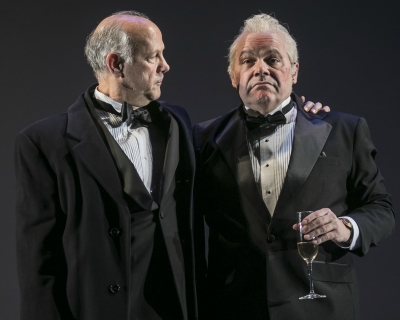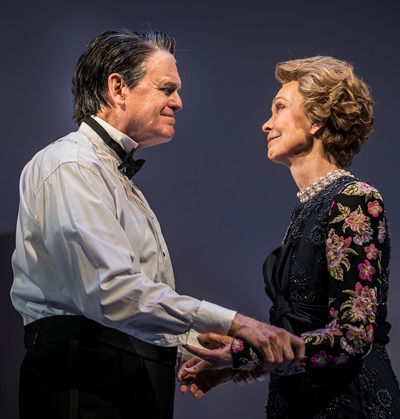‘Blind Date’ at Goodman: The epochal meeting that changed the world – and all that glam
Review: “Blind Date” by Rogelio Martinez, at Goodman Theatre through Feb. 25. ★★★
By Lawrence B. Johnson
Three other plays edged into mind as I watched Rogelio Martinez’s ambitious and entertaining political drama “Blind Date” unfold on the Goodman Theatre stage. Two were more distilled slants on similar big-picture crises. But it was the third that finally lined itself up beside this glossy romp: the unpretentiously cosmetic musical “War Paint.”
“Blind Date” reimagines the historical meeting between President Ronald Reagan and Soviet General Secretary Mikhail Gorbachev, a delicately achieved face-to-face that would help to bring the Cold War to an end.
 It’s a multifaceted memory play, with three narrators: U.S. Secretary of State George Shultz and his Soviet counterpart, Eduard Shevardnadze, and Reagan biographer Edmund Morris. If Morris (played by Thomas J. Cox) is seen as a humorless academic, the wry banter between Shultz (Jim Ortlieb) and Shevardnadze (Steve Pickering) – whose mutual good faith and determination make the meeting possible – sets the sparky tone for everything that follows.
It’s a multifaceted memory play, with three narrators: U.S. Secretary of State George Shultz and his Soviet counterpart, Eduard Shevardnadze, and Reagan biographer Edmund Morris. If Morris (played by Thomas J. Cox) is seen as a humorless academic, the wry banter between Shultz (Jim Ortlieb) and Shevardnadze (Steve Pickering) – whose mutual good faith and determination make the meeting possible – sets the sparky tone for everything that follows.
And then there are the wives: practical, droll Nancy Reagan (Deanna Dunagan) and the stylish, urbane Raisa Gorbachev (Mary Beth Fisher). A set piece for the girls at tea, and most elegantly at each other’s throats, is the real, laugh-out-loud summit here. In a well-cast production, Dunagan and Fisher essentially steal the show.
 Their husbands, the two most powerful men in the world, are done in sharp portraits by Rob Riley as Reagan and William Dick as Gorbachev – the former in homey caricature and the latter in calculating understatement.
Their husbands, the two most powerful men in the world, are done in sharp portraits by Rob Riley as Reagan and William Dick as Gorbachev – the former in homey caricature and the latter in calculating understatement.
Riley’s take on the film star become president is precise down to phrase lengths and husky breathing. That granted, his closely mannered impersonation and the character’s windy speechifying begin to feel like the real center of Martinez’s play, as the less sexy, albeit weighty, events themselves recede. “Blind Date” rides its imagery, wit and one-liners to exhaustion. It sheds no light, has no point. It’s a gussied-up sitcom, largely glam and chortle.
Which brings me back to those other plays. “War Paint,” about the rivalry between Helena Rubinstein and Elizabeth Arden, might have been the model for this glitzy outing. “Blind Date” is funny. I laughed a lot. But it is not also serious, despite the profound seriousness of its subject matter. True to the play, the Goodman production directed by Robert Falls is flamboyant, energized, slick – carefully, if self-consciously, choreographed, seriously theatrical. But it’s one thing not to care especially about two purveyors of makeup vying for dominance, quite another to see Ronnie and Gorby’s excellent adventure done a soft-shoe shy of song and dance.
 This is one big production, designed by Riccardo Hernández with grand curved partitions that rotate for scene changes on a carousel that also transports the actors. A core cast of 10 is augmented by 11 other actors who portray Soviet citizens, KGB officers, Politburo members, White House staff, Secret Service, American military officers, journalists and so forth. Many hats off to costume designer Amy Clark.
This is one big production, designed by Riccardo Hernández with grand curved partitions that rotate for scene changes on a carousel that also transports the actors. A core cast of 10 is augmented by 11 other actors who portray Soviet citizens, KGB officers, Politburo members, White House staff, Secret Service, American military officers, journalists and so forth. Many hats off to costume designer Amy Clark.
All told, there’s as much circus as drama in “Blind Date,” and that’s what put me in mind of the two other plays I mentioned at the top: “A Walk in the Woods,” Lee Blessing’s two-hander about American and Russian negotiators striving toward disarmament, and “Copenhagen,” Michael Frayn’s three-character examination of the moral crisis of nuclear arms. A park bench in the first instance and a couple of chairs in the second suffice for sets. The substance, however, is formidable in both plays, and it resides in the writing.
In that comparison, one surveys “Blind Date” and wonders, “Where’s the beef?” Or perhaps more to the point: “Where’s the band?”
Related Link:
- Performance location, dates and times: Details at TheatreInChicago.com
Tags: Amy Clark, Deanna Dunagan, Jim Ortlieb, Mary Beth Fisher, Riccardo Hernandez, Rob Riley, Robert Falls, Rogelio Martinez, Steve Pickering, Thomas J. Cox, William Dick


